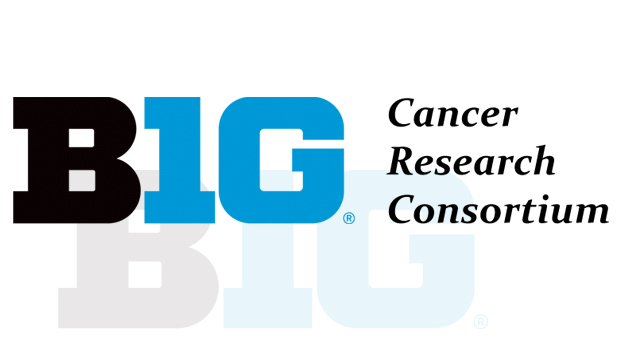Penn State Hershey Cancer Institute joins Big Ten Cancer Research Consortium

In athletics, the Big Ten universities compete against each other, but now many will join together against a common foe — cancer.
Leaders from the universities' cancer centers, including Penn State Hershey Cancer Institute, will kick-off the Big Ten Cancer Research Consortium on June 1 in Chicago. They are uniting to transform cancer research through collaborative oncology trials that leverage the scientific and clinical expertise of the Big Ten universities.
The consortium's activities will benefit patients because researchers will work together to turn ideas into potential new treatments. The clinical trials they develop will be linked to molecular diagnostics, enabling researchers to understand what drives the cancers to grow and what might be done to stop them from growing.
Also, the consortium forms a powerful collaboration because of the impact each university already has made in cancer research plus a solid research infrastructure is already in place at each university. The consortium also leverages geographical locations and existing relationships among the cancer centers.
“At Penn State Hershey, an important cancer research focus is to develop molecular diagnostic tools that are tailored to individuals using a personalized medicine approach,” said Dr. Daniel A. Notterman, vice dean for research and graduate studies, Penn State College of Medicine and associate vice president for health sciences research, Penn State. “This new collaboration with our Big 10 colleagues will enhance efforts already underway by our Cancer Institute scientists to find better, more efficient ways to diagnose, treat, and prevent cancer and to offer the hope of cure to those dealing with cancer.”
Penn State Hershey Cancer Institute is central Pennsylvania's only comprehensive cancer center, with a special research emphasis on cancer-producing behaviors that are more prevalent among an underserved rural population. Cancer Institute research highlights include innovative studies to develop individualized approaches for treatment and prevention of lung cancer; collaboration between medical and materials science researchers to develop treatments for various types of leukemia using nanotechnology to target only cancer cells; and development of novel therapeutics to treat metastatic melanoma using an approach that regulates the processes leading to tumor development. The Cancer Institute has 138 investigators from 25 academic departments in six colleges located at the Hershey and University Park campuses and approximately $14 million in NIH funding for studies focused on cancer prevention, diagnosis and treatment.
At the Cancer Institute, multidisciplinary teams of clinical researchers—hematologists, oncologists, radiation oncologists and surgical oncologists—have more than 90 active clinical trials to offer patients fighting various types of cancer.
The Cancer Institute's participation in the consortium is led by Dr. Chandra P. Belani, Cancer Institute deputy director and Miriam Beckner Distinguished Professor of Medicine, and Cindy Naret, director of the Cancer Institute Clinical Trials Office.
The Big Ten Cancer Research Consortium creates a unique team-research culture in which cancer leaders will collaborate with and mentor the research leaders of tomorrow with the goal of improving the lives of all cancer patients. The consortium will provide junior faculty and fellows the opportunity to write, conduct, and complete trials, which would not normally be done at a single institution or on a nat ional level for young investigators.
The Big Ten Cancer Research Consortium is made up of the following universities and cancer centers:
- Indiana University (Indiana University Melvin and Bren Simon Cancer Center)
- Northwestern University (Robert H. Lurie Comprehensive Cancer Center)
- Penn State University (Penn State Hershey Cancer Institute)
- Purdue University (Purdue University Center for Cancer Research)
- Rutgers University (The Cancer Institute of New Jersey becomes part of Rutgers on July 1)
- University of Illinois (University of Illinois Cancer Center)
- University of Iowa (Holden Comprehensive Cancer Center)
- University of Michigan (University of Michigan Comprehensive Cancer Center)
- University of Minnesota (Masonic Cancer Center)
- University of Nebraska (Fred & Pamela Buffett Cancer Center)
- University of Wisconsin (Carbone Comprehensive Cancer Center)
The Indianapolis-based Hoosier Oncology Group will serve as the administrative headquarters for the Big Ten Cancer Research Consortium. Since 1984, Hoosier Oncology Group has initiated more than 150 trials with more than 4,000 patients.
If you're having trouble accessing this content, or would like it in another format, please email Penn State Health Marketing & Communications.
